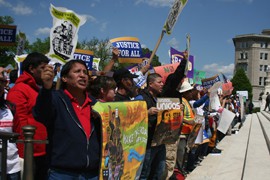Cronkite News has moved to a new home at cronkitenews.azpbs.org. Use this site to search archives from 2011 to May 2015. You can search the new site for current stories.
Opponents have millions set aside to continue fight against SB 1070
WASHINGTON – Opponents of Arizona’s SB 1070 said Monday they have set aside millions of dollars to continue fighting the law, just hours after the U.S. Supreme Court released its decision on the immigration law.
Far from being the last word on SB 1070, Monday’s ruling appears to be just another step in a fight that will likely continue for years.
A divided court rejected three parts of the law but refused to block a fourth part requiring local police, in some circumstances, to check the immigration status of suspects stopped for other crimes.
The so-called “papers, please” portion of the law is the one that most troubles opponents, who say it opens the door to racial profiling.
The American Civil Liberties Union said Monday it has set aside nearly $8.8 million for lawsuits against the “papers, please” provision of SB 1070 and any similar laws other states may try to implement.
“We will bring these lawsuits whenever and wherever they may come,” said Anthony Romero, executive director of the ACLU, in a conference call Monday.
While Arizona Gov. Jan Brewer claimed victory in the court’s decision, she was already bracing Monday for further lawsuits. The ruling “does not mark the end of our journey,” she said in a press release.
“Our critics are already preparing new litigation tactics in response to their loss at the Supreme Court,” Brewer said.
Romero said the court “kicked the can down the road” by leaving room for the remaining provision of SB 1070 to be decided at a lower-level court. But the ACLU said it is prepared to fight at the U.S. District Court in Arizona.
“We are moving forward with our existing lawsuit,” said Alessandra Soler, spokeswoman for ACLU Arizona. “We will demonstrate to the court that it is impossible to pursue without racial profiling.”
That case, overseen by U.S. District Judge Susan Bolton, should move more quickly now that the high court has released its decision, Soler said.
The Supreme Court did not address the constitutionality of the “papers, please” section, saying it was not ruling out the possibility of “other pre-emption and constitutional challenges to the law … as applied after it goes into effect.” But it did say that Bolton was incorrect to block that part of the law without showing that it, “in fact conflicts with federal immigration law.”
The case was returned to the circuit court, which is expected to return it to Bolton to lift the injunction. That process is expected to take four to five weeks, experts said.
Mariaelena Hincapie, executive director of the National Immigration Law Center, said her organization and others are “fighting vigorously” to stop the court from lifting the injunction.
Hincapie pledged, along with ACLU and other civil rights groups in the conference call, to pursue any legal means necessary to defend those affected by the law if it is put into effect.
“It is simply un-American and will be struck down,” she said.
The court’s decision Monday opened a “floodgate” to further lawsuits and to racial profiling, Romero said.
Brewer insisted that the law will be enforced properly and that police officers have been trained regarding its implementation for the past two years.
“Law enforcement will be held accountable should this statute be misused in a fashion that violates an individual’s civil rights,” Brewer said.
Romero disagreed, saying that the law leaves an “open question” as to how it is possible to carry out the law without racially profiling and discrimination.
“She’s playing politics with our American values,” Romero said of Brewer.







